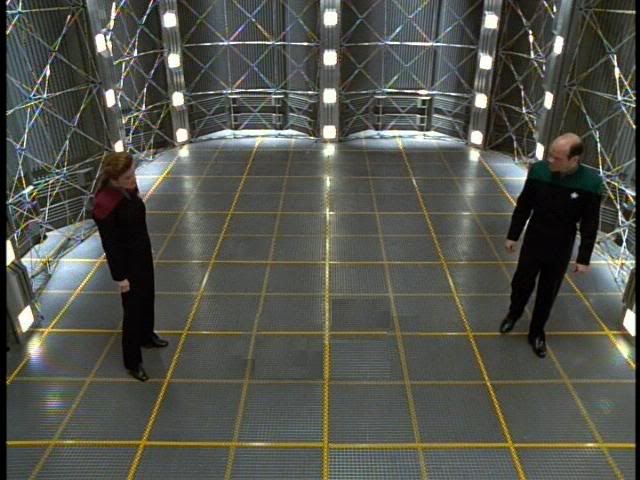Picture this: you've sat down for the Football World Cup final, or a long-awaited sequel to the "Sex and the City" movie and you're watching all the action unfold in 3-D on your coffee table.
...
The reason for renewed optimism in three-dimensional technology is a breakthrough in rewritable and erasable holographic systems made earlier this year by researchers at the University of Arizona.
I don't care about watching TV in 3-d. That's boring. But if we can get high-res 3-d projections, then we can write AI and get closer to making the Star Trek holodeck!
I will not have walked this earth in vain, if one day I can make software that emulates the Star Trek holodeck.

It might not happen until I'm seventy years old, and the touch aspect won't work and my holodecks would be immediately overtaken by porn. But I would still be happy.
This part of the article makes me skeptical:
The researchers produced displays that can be erased and rewritten in a matter of minutes.
To create television sets the images would need to be changing multiple times each second -- but Peyghambarian is very optimistic this can happen.
...
"It took us a while to make that first breakthrough, but as soon as you have the first element of it working the rest often comes more rapidly," he said. "What we are doing now is trying to make the model better. What we showed is just one color, what we are doing now is trying to use three colors. The original display was four inches by four inches and now we're going for something at least as big as a computer screen."
There are no more great barriers to overcome now, he said.
Really? Projecting a single color a few times per hour is not much harder than a high-resolution model at 24 frames per second? I guess if you say so...
Oh, and the best part: If we can have 3-d projections from a portable source which emanates audio, then...
"holographic miniature pig"
ReplyDeleteThis closing statement made me chuckle. :) Thanks for a good start to my work day. "holographic miniature pigs", the day can only go downhill from here.
But if we can get high-res 3-d projections, then we can write AI
ReplyDeleteYes, I understand the lack of high res real-time 3D projections is what's holding back AI research.
I suspect men would be more inclined to overlook the repetative syntax, flat emotional response and obvious lack of semantic depth if either Alice or Eliza had huge, pendulous knockers. Seriously.
ReplyDeleteSounds like a new 20% project to me.
ReplyDeleteThere are no more great barriers to overcome now, he said.
ReplyDeleteUh...yeah. Science/engineering is littered with quotes like that. Think of molecular memory, nanotubes and whatnot. "Hmm...I was able to accidentally get one device to sort of work so it should be trivial to get 32 Gb worth of devices to work with the 100% yield necessary to make money. Let me just call up some VC friends..."
and my holodecks would be immediately overtaken by porn.
I think we're more likely to have robotic sex slaves than holodeck porn, but what do I know?
A virtual Niniane?
ReplyDeleteHow would this get done? A full body scan of the origional?
Call me a raging egomaniac, but Anonymous's comment above makes me think of a holodeck full of duplicates of myself. I think it would be interesting: a technologically induced out of body experience. They could even be set to duplicate my actions on a varying set of time delays from milliseconds to minutes apart. It'd be like those musicians with loopstations, except probably not musical.
ReplyDeleteYou, my friend, are a raging egomaniac. :)
ReplyDeleteBut this could have such excellent instructive value: whenever someone fails to acknowledge a particularly annoying personal habit, challenge them to spend 60 minutes in a small room with 10 copies of themselves engaging in the same behavior. Voila, instant empathy! I wonder how many people could really stand themselves for any length of time?